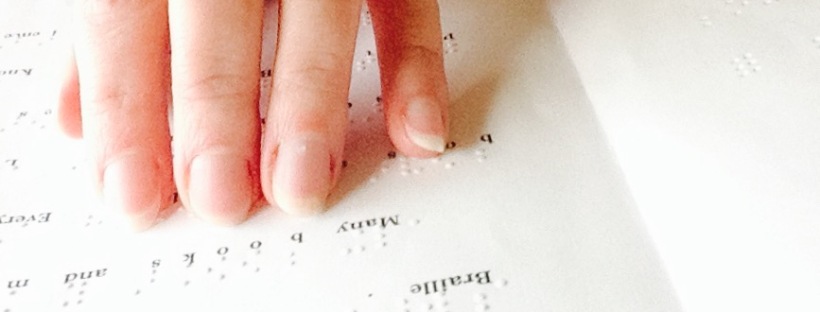Words. Colors on paper in purposeful patterns. Sounds swirling in the air. While we read them, we hear them, and we understand them, many of us may not think about how we can feel them.
Yet I came to know words as something I could get my hands on – literally. When I was about six years old, I started lessons in Braille, the system of raised dots by which the blind and visually impaired read. You could find me pouring over my stacks of flashcards with Braille dots on one side and words written in English with huge purple-marker letters on the other. Words like “knowledge” were no longer abstract concepts connected to intangible letters. They were a complex code, yes, but they were also something I could feel pressing into my fingertips, sparking my memory. It was then that I think I really came to love letters and words and the wonder of communication.
While I grasped basic Braille quickly, it took me longer to realize that words really are tangible in a whole other sense as well. Have you ever heard the saying “Sticks and stones may break my bones, but words can never hurt me”? Does anyone actually believe that? I doubt it because words can hurt. They can even break hearts.
On the other hand, they can also bring healing.
So much of this depends on the feel of the words – how they touch the receiver of them. One word can carry so many different meanings based off of the tone, the intonation, the accent, the volume and, of course, the words surrounding it.
Even more, its touch depends on how it is felt by the recipient. One person writes something that looks bland on paper, but it feels like a sword-slice to the reader. In another case, simple syllables so sweeten the listener’s soul that their life is forever changed for the better.
Some people are very tender. Like un-calloused fingertips running over Braille, their spirits pick up subtle hints in a spoken or written word. Others may be a little tougher and so miss the nuances.
I think neither is truly problematic until they start expecting others to feel the same way as they do about words. It takes a great deal of effort at times to think not only about what the words you’re writing or speaking say but also how they feel.
May the touch of our words not give bruises like sticks and stones. May the touch of our words build up and give grace.
“Let no corrupting talk come out of your mouths, but only such as is good for building up, as fits the occasion, that it may give grace to those who hear.” ~Ephesians 4:29, ESV

